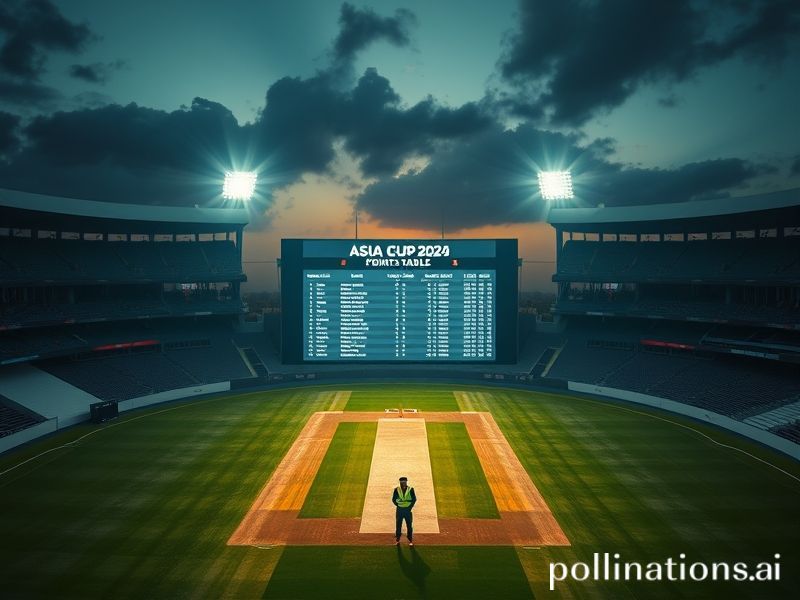Asia Cup Points Table: Where Cricket Scores Become Global Mood Swings
The Asia Cup points table is, on its surface, a tidy ledger of wins, losses, net-run-rates and the occasional no-result that keeps actuaries awake at night. Yet step back far enough—say, from a satellite drifting above the Indian Ocean—and it starts to resemble the world’s most flamboyant mood ring. A flick of green for Pakistan, a smear of blue for India, a stubborn patch of red for Sri Lanka, and suddenly half the planet’s WhatsApp groups are vibrating with the intensity of a small earthquake.
In global terms, the table is essentially a geopolitical Rorschach test. Foreign desks from London to Lagos glance at it and see, variously: a proxy scoreboard for nuclear neighbors, a barometer of diaspora purchasing power (ticket sites crash in Toronto, taxis idle in Dubai), and a reminder that the International Cricket Council still insists on calling this a “regional” tournament even though its broadcast footprint could carpet the moon. Meanwhile, over in Davos, some earnest panel on “South-South cooperation” cites the Cup’s TV rights auction as proof that emerging markets have finally learned to monetise their sibling rivalries. The panelists then clink mineral water to celebrate the triumph of capitalism, blissfully unaware that half the revenue will be spent bribing rain gods.
The points table’s arithmetic cruelty—fractions of run-rates calculated to the third decimal—mirrors the precision with which the global economy now dispenses hope. Bangladesh discovers that a heroic victory can still be neutralised by a drizzle in Colombo, an existential lesson worthy of Camus. Afghanistan, still hunting its first berth in a final, learns that moral victories don’t accrue interest in the currency futures market. And if you’re Nepal, making a cameo like the intern who accidentally got CC’d on a boardroom brawl, the table politely confirms you’re here for the exposure, not the trophy.
Of course, every shift in the table ricochets through betting syndicates from Karachi’s Empress Market to London’s Canary Wharf, where algorithms chew on Duckworth-Lewis parabolas as if they were sovereign debt curves. Crypto traders in Singapore have even issued a memecoin pegged to Sri Lanka’s net-run-rate; its white paper contains the sentence, “In the event of washout, holders may redeem tokens for emotional support.” Naturally, it’s up 340 percent.
Then there is the soft-power score hidden between the columns. When India tops the table, Twitter India trends #BoycottEverythingElse; when Pakistan leads, state TV cuts to stock footage of truck art and qawwali like a national screensaver. Sri Lanka’s mere presence on the board—despite an economy held together by bailouts and the sheer will of tuk-tuk drivers—prompts think-pieces in the Atlantic about “resilience branding.” Somewhere, an intern at the UN is drafting a resolution to replace GDP with NRR (Net Run Rate) on the Human Development Index. It will be vetoed, but only after a spirited debate on whether rain rules violate human rights.
And yet, for all the spreadsheets and satellite feeds, the table still boils down to twenty-two people chasing leather under floodlights while millions project their unspoken anxieties onto every dot ball. Climate change looms, supply chains unravel, AI is coming for your job—but right now, whether that green dot inches ahead of the blue is the most pressing matter in at least a dozen parliaments. Tomorrow the world will go back to pretending it cares about interest rates and war crimes. Tonight, though, we refresh the points table like pilgrims at a digital shrine, hoping the numbers absolve us of our larger scorecard.
In the end, the Asia Cup points table is not just a ranking; it is a cosmic ledger of human folly, updated in real time. It reminds us that nations will weaponise anything—even arithmetic—if it lets them claim temporary dominion over the primal need to gloat. And when the last decimal is tallied and the confetti cannons misfire, the table resets to zero, ready for the next cycle of hope, heartbreak and ingenious rationalisations. Until then, may your net-run-rate be ever in your favour, and may the rains hold off long enough for us to pretend the universe is fair.







